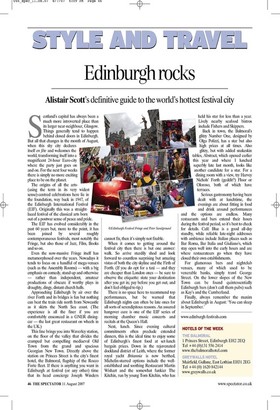Edinburgh rocks Alistair Scott's definitive guide to the world's hottest
festival city The origins of all the arts(using the term in its very widest sense)-centred celebrations here lie in the foundation, way back in 1947, of the Edinburgh International Festival (EIF). Originally this was a straightlaced festival of the classical arts born out of a postwar sense of peace and pride.
The EIF has evolved considerably in the past 60 years but, more to the point, it has been joined by several roughly contemporaneous festivals, most notably the Fringe, but also those of Jazz, Film, Books and so on.
Even the now-massive Fringe itself has metamorphosed over the years. Nowadays it tends to focus on a handful of mega-venues (such as the Assembly Rooms) — with a big emphasis on comedy, stand-up and otherwise — rather than independent, amateur productions of obscure if worthy plays in draughty, dingy, distant church halls.
Approaching Edinburgh by air over the river Forth and its bridges is fun but nothing can beat the train ride north from Newcastle as it skirts the North Sea coast. (The experience is all the finer if you are comfortably ensconced in a GNER diningcar — the last great restaurant on wheels in the UK) This line brings you into Waverley station, on the floor of the valley that divides the cramped but compelling mediaeval Old Town from the grand and spacious Georgian New Town. Directly above the station on Princes Street is the city's finest hotel, the Balmoral, flagship of the Rocco Forte fleet. If there is anything you want in Edinburgh at festival (or any other) time that its head concierge Joseph Winders cannot fa, then it's simply not fixable.
When it comes to getting around the festival city then there is but one answer: walk. So arrive sturdily shod and look forward to countless surprising but amazing vistas of both the city skyline and the Firth of Forth. (If you do opt for a taxi — and they are cheaper than London ones — be sure to observe the etiquette: state your destination after you get in; pay before you get out; and don't feel obliged to tip.) There is no space here to recommend top performances, but be warned that Edinburgh nights can often be late ones for all sorts of serendipitous reasons. An assured hangover cure is one of the EIF series of morning chamber music concerts and recitals at the Queen's Hall.
Next, lunch. Since evening cultural commitments often preclude extended dinners, this is the ideal time to enjoy some of Edinburgh's finest food at set-lunch bargain prices. Down in the rejuvenated dockland district of Leith, where the former royal yacht Britannia is now berthed, Michelin-starred options include the wellestablished and soothing Restaurant Martin Wishart and the somewhat funkier The Kitchin, run by young Tom Kitchin, who has held his star for less than a year. Lively nearby seafood bistros include Fishers and Skippers.
Serious gastronomy having been dealt with at lunchtime, the evenings are about fitting in food and drink around performances and the options are endless. Many restaurants and bars extend their hours during the festival period, so it's best to check for details. Café Blue is a good all-day standby, while reliable late-night addresses with ambience include Italian places such as Bar Roma, Bar Italia and Giuliano's, which stay open well into the early hours and are where restaurateurs go when they have closed their own establishments.
For glamorous bars and nightclub venues, many of which used to be venerable banks, simply trawl George Street. On the lower slopes of the New Town can be found quintessentially Edinburgh bars (don't call them pubs) such as Kay's and the Cumberland.
Finally, always remember the maxim about Edinburgh in August: 'You can sleep in September.'
www.edinburgh-festivals.com HOTELS OF THE WEEK THE BALMORAL 1 Princes Street, Edinburgh EH2 2EQ Tel +44 (0)131 556 2414 www.thebalmoralhotel.com GREYWALLS HOTEL Muirfield, Gullane, East Lothian EH31 2EG Tel +44 (0) 1620 842144 www.greywalls.co.uk









































 Previous page
Previous page